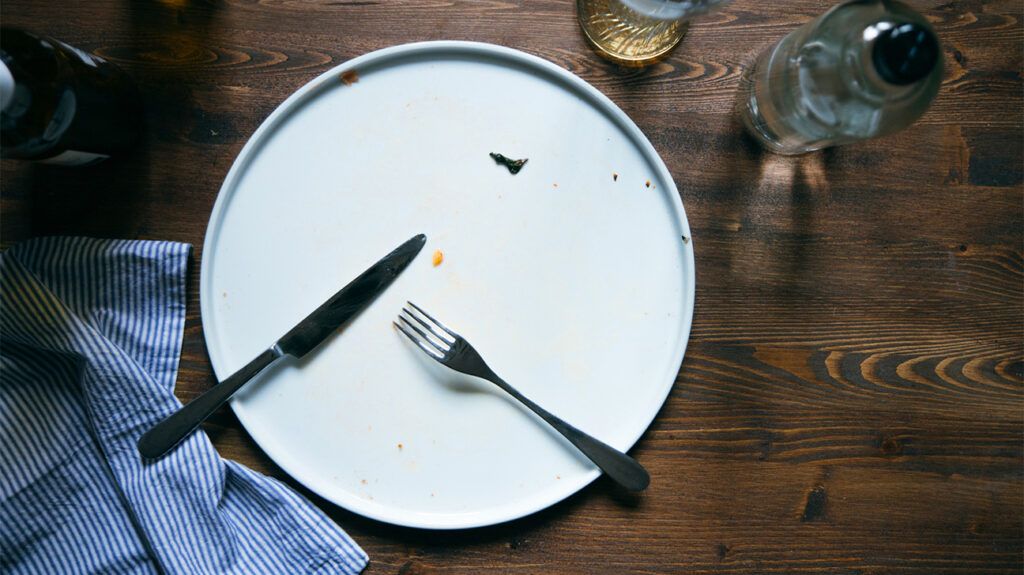Feelings of anxiety can dampen the satisfaction gained by eating a tasty meal, but there are ways to cope.

Being worried or anxious can sometimes make you lose your appetite. But what about experiencing anxiety after eating?
For some people, meals aren’t always pleasurable experiences. Instead, they can be precursors to feelings of concern, uneasiness, and apprehension.
Feelings of anxiety can be different for everyone.
If you’re feeling uneasy after eating, you might also experience other symptoms of anxiety, such as:
- irritability
- nausea
- difficulty concentrating
- muscle tension
- fatigue
- sleeplessness
- uncontrollable feelings of worry
- sweating
- elevated heart rate
- shortness of breath
- trembling
- choking sensation
- overwhelming sense of dread or doom
You may be wondering why your anxiety increases after you eat.
Anxiety after eating may be a symptom of many conditions. Sometimes, it may just be a reflection of your emotional state at the moment.
Circumstantial anxiety, also known as situational anxiety, can occur when you’re focused on something specific, like traveling, a competitive event, or an important business meeting.
Feeling anxiety after you eat lunch, for example, may not be so out of place if you’ve got a big presentation that afternoon.
Other possible reasons for feeling anxiety after eating include:
- Digestive tract imbalances. Research suggests inflammation and microbial imbalances in the digestive system can contribute to symptoms of anxiety.
- Presence of an eating disorder. Eating disorders like anorexia, bulimia, and binge eating disorder are often accompanied by food-related anxiety.
- Conditioned taste aversion.
Research suggests you may develop conditioned responses based on past experiences. If you became sick after eating a certain food, you may never feel good about that food again. - Food sensitivities and allergies. Twenty-year
research data shows food-related anxiety is often associated with fear of encountering certain foods that may cause negative reactions. - Personal expectations. Guilt and worry about indulging at mealtime or eating when you’re not hungry may cause anxiety.
- Foods high in sugar and fat. A
2013 research review suggests diets high in fat and sugar, and with high palatability, were linked to symptoms of anxiety in animal models. - High glycemic index foods. Observational
evidence suggests high glycemic index foods, like white rice and french fries, may increase symptoms of anxiety. - Hypoglycemia. Low blood sugar, known as hypoglycemia, can occur after eating. It’s followed by insulin production and an increase in epinephrine, which
may be associated with symptoms of anxiety. - Social anxiety. If you live with social anxiety, you may experience anxiety symptoms while dining with others.
Panic attack after eating?
Sometimes, anxiety after eating is something more. It can feel as if the world is crashing in on you.
Panic attacks are intense episodes of fear. They often have a sudden onset and are accompanied by physical symptoms such as:
- shaking or trembling
- excessive sweating
- heart palpitations, heart pounding, or increased heart rate
- rapid breathing
- sensations of smothering or choking
- pervasive feelings of doom, dread, or being out of control
If you’ve had more than one panic attack after eating, you can talk with a healthcare professional. They could help uncover underlying causes and potential treatments.
Treatment of anxiety after eating may require the guidance of a healthcare team. Anxiety itself is often a symptom, not just a condition. More serious concerns may be at hand that need treatment.
While you work with a healthcare professional to uncover the cause of your anxiety after eating, you can manage symptoms by trying the following:
Log your food patterns
Keeping track of what you eat and how it makes you feel can help you identify patterns and avoid foods that may be linked to feelings of anxiety.
Take a probiotic
A
While researchers conclude more research is needed to consider probiotics a therapy for anxiety, your doctor can help you decide whether a probiotic might be right and safe for you.
Practice self-compassion
If anxiety after eating may be related to guilt or personal expectations, practicing self-compassion might help.
Self-compassion is the ability to forgive and care for yourself, rather than being self-critical or punishing about food decisions.
Of course, this may be easier said than done. But research says it’s worth a try: A 2010 study linked self-compassion to lower levels of anxiety and depression.
Find ways to relax in the moment
Since anxiety after eating occurs at a very specific time, finding ways to relax in the moment may help take the edge off what you’re experiencing.
Many breathing techniques, meditation strategies, and focus exercises can all be done after eating, no matter where you are.
Speak with a mental health professional
While your primary care doctor can help you address any physical challenges contributing to food-related anxiety, some factors may also require the expertise of a mental health professional.
Treating underlying mental health causes is one of the best ways to manage and relieve symptoms.
You’re not alone if you experience anxiety after eating.
Eating disorders, anxiety disorders, and other mental health conditions may contribute to postmeal anxiousness.
What you’re experiencing and why you’re experiencing it are unique to you. You may be worried about looming obligations, stressed about your meal, or have a food intolerance you don’t know about yet.
Developing relaxation skills and food journaling habits can help manage symptoms while you explore food-related anxiety with your healthcare team.
